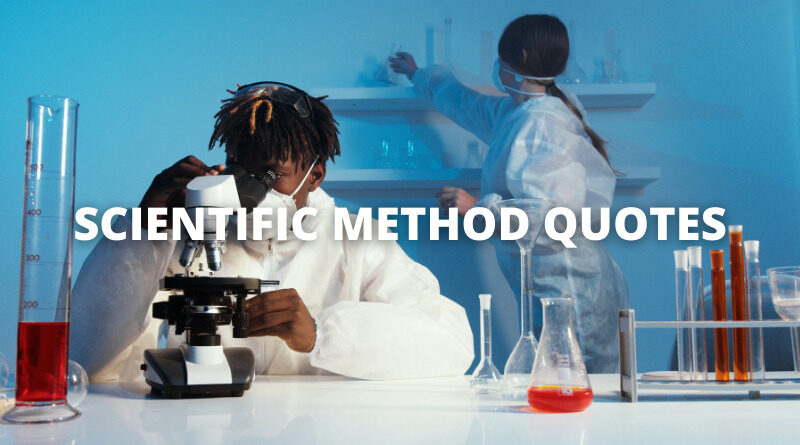65 Scientific Method Quotes On Success In Life
These scientific method quotes will inspire you. Scientific method, mathematical and experimental technique employed in the sciences or a method of procedure that has characterized natural science since the 17th century, consisting in systematic observation, measurement, and experiment, and the formulation, testing, and modification of hypotheses.
A collection of motivating, happy, and encouraging scientific method quotes, scientific method sayings, and scientific method proverbs.
Best Scientific Method Quotes
- “The man of science has learned to believe in justification, not by faith, but by verification.” ~ Thomas Huxley
- “Our scientific power has outrun our spiritual power. We have guided missiles and misguided men.” ~ Martin Luther King, Jr.
- “The scientific method of examining facts is not peculiar to one class of phenomena and to one class of workers; it is applicable to social as well as to physical problems, and we must carefully guard ourselves against supposing that the scientific frame of mind is a peculiarity of the professional scientist.” ~ Karl Pearson
-
“In science it often happens that scientists say, “You know that’s a really good argument; my position is mistaken…”” ~ Carl Sagan
- “There are two objectionable types of believers: those who believe the incredible and those who believe that ‘belief’ must be discarded and replaced by ‘the scientific method.” ~ Max Born
- “‘The scientific method,’ Thomas Henry Huxley once wrote, ‘is nothing but the normal working of the human mind.’ That is to say, when the mind is working; that is to say further, when it is engaged in correcting its mistakes.” ~ Neil Postman
- “We are the recipients of scientific method. We can each be a creative and active part of it if we so desire.” ~ Kary Mullis
-
“When the number of factors coming into play in a phenomenological complex is too large scientific method in most cases fails. One need only think of the weather, in which case the prediction even for a few days ahead is impossible.” ~ Albert Einstein
- “The most exciting phrase to hear in science, the one that heralds new discoveries, is not ‘Eureka!’ but ‘That’s funny…'” ~ Isaac Asimov
- “Traditional scientific method has always been at the very best, 20 – 20 hindsight. It’s good for seeing where you’ve been. It’s good for testing the truth of what you think you know, but it can’t tell you where you ought to go.” ~ Robert M. Pirsig
- “My background is basically scientific math. My Dad was a physicist, so I have it in my blood somewhere. Scientific method is very important to me. I think anything that contradicts it is probably not true.” ~ John Astin
-
“The scientific method actually correctly uses the most direct evidence as the most reliable, because that’s the way you are least likely to get led astray into dead ends and to misunderstand your data.” ~ Aubrey de Grey
- “Influenced by him, and probably even more so by my brother Theodore a year older than me, I soon became interested in biology and developed a respect for the importance of science and the scientific method.” ~ Frederick Sanger
- “I don’t think the scientific method and the science fictional method are really analogous. The thing about them is that neither is really practiced very much, at least not consciously. But the fact that they are methodical does relate them.” ~ Frederik Pohl
- “The scientific method,” Thomas Henry Huxley once wrote, “is nothing but the normal working of the human mind.” That is to say, when the mind is working; that is to say further, when it is engaged in correcting its mistakes. Taking this point of view, we may conclude that science is not physics, biology, or chemistry — is not even a ”subject ” — but a moral imperative drawn from a larger narrative whose purpose is to give perspective, balance, and humility to learning.” ~ Neil Postman
-
“Science is what scientists do, and there are as many scientific methods as there are individual scientists.” ~ Percy Williams Bridgman
- “When the number of factors coming into play in a phenomenological complex is too large scientific method in most cases fails. One need only think of the weather, in which case the prediction even for a few days ahead is impossible. Nevertheless, no one doubts that we are confronted with a causal connection whose causal components are in the main known to us. Occurrences in this domain are beyond the reach of exact prediction because of the variety of factors in operation, not because of any lack of order in nature.” ~ Albert Einstein
- “This means that to entrust to science – or to deliberate control according to scientific principles – more than scientific method can achieve may have deplorable effects.” ~ Friedrich August von Hayek
- “My feeling is that scientific method has the power to account for and interlink all phenomena in the universe, including its origin, using the laws of nature. But that still leaves the laws unexplained.” ~ Paul Davies
-
“Creation is not taking place now, so far as can be observed. Therefore, it was accomplished sometime in the past, if at all, and thus is inaccessible to the scientific method.” ~ Henry M. Morris
- “We should be teaching our children the scientific method and the reasons for a Bill of Rights. With it comes a certain decency, humility and community spirit.” ~ Carl Sagan
- “If we can’t think for ourselves, if we’re unwilling to question authority, then we’re just putty in the hands of those in power.” ~ Carl Sagan
- “The purpose of scientific enquiry is not to compile an inventory of factual information, nor to build up a totalitarian world picture of natural Laws in which every event that is not compulsory is forbidden. We should think of it rather as a logically articulated structure of justifiable beliefs about nature.” ~ Peter Medawar
-
“Research is to see what everybody else has seen, and to think what nobody else has thought.” ~ Albert Szent-Gyorgyi
- “But in practical affairs, particularly in politics, men are needed who combine human experience and interest in human relations with a knowledge of science and technology.” ~ Max Born
- “In science it often happens that scientists say, ‘You know that’s a really good argument; my position is mistaken,’ and then they would actually change their minds and you never hear that old view from them again. They really do it. It doesn’t happen as often as it should, because scientists are human and change is sometimes painful. But it happens every day. I cannot recall the last time something like that happened in politics or religion.” ~ Carl Sagan
- “Reason, observation, and experience; the holy trinity of science.” ~ Robert Green Ingersoll
-
“The plural of anecdote is not data.” ~ Marc Bekoff
- “It appears to me that those who rely simply on the weight of authority to prove any assertion, without searching out the arguments to support it, act absurdly. I wish to question freely and to answer freely without any sort of adulation. That well becomes any who are sincere in the search for truth.” ~ Vincenzo Galilei
- “A theory which cannot be mortally endangered cannot be alive.” ~ W. A. H. Rushton
- “Science is not, as so many seem to think, something apart, which has to do with telescopes, retorts, and test-tubes, and especially with nasty smells, but it is a way of searching out by observation, trial and classification; whether the phenomena investigated be the outcome of human activities, or of the more direct workings of nature’s laws. Its methods admit of nothing untidy or slip-shod; its keynote is accuracy and its goal is truth.” ~ Archibald Garrod
-
“Induction for deduction, with a view to construction.” ~ Auguste Comte
- “There are two ways of forming an opinion. One is the scientific method; the other, the scholastic. To the scientific mind, experimental proof is all-important, and theory is merely a convenience in description, to be junked when it no longer fits. To the academic mind, authority is everything, and facts are junked when they do not fit theory.” ~ Robert A. Heinlein
- “The scientific method is the ultimate elegant explanation. It is the ultimate foundation for anything worthy of the name “explanation”. It makes no sense to talk about explanations without having a process for deciding which are right and which are wrong, and in a broad sense that is what the scientific method is about. All of the other wonderful explanations celebrated here owe their origin and credibility to the process by which they are verified-the scientific method.” ~ Nathan Myhrvold
- “The scientific method is designed to help investigators overcome the most entrenched human cognitive habit: the confirmation bias, the tendency to notice and remember evidence that confirms our beliefs or decisions, and to ignore, dismiss, or forget evidence that is discrepant. That’s why we are all inclined to stick to a hypothesis we believe in. Science is one way of forcing us, kicking and screaming if necessary, to modify our views.” ~ Carol Tavris
-
“Science is a system of statements based on direct experience, and controlled by experimental verification. Verification in science is not, however, of single statements but of the entire system or a sub-system of such statements.” ~ Rudolf Carnap
- “It takes a fearless, unflinching love and deep humility to accept the universe as it is. The most effective way he knew to accomplish that, the most powerful tool at his disposal, was the scientific method, which over time winnows out deception. It can’t give you absolute truth because science is a permanent revolution, always subject to revision, but it can give you successive approximations of reality.” ~ Ann Druyan
- “Psychologists pay lip service to the scientific method, and use it whenever it is convenient; but when it isn’t they make wild leaps of their uncontrolled fancy.” ~ Anthony Standen
- “This is one of the most important lessons of the scientific method: if you cannot fail, you cannot learn.” ~ Eric Ries
- “We should be on our guard not to overestimate science and scientific methods when it is a question of human problems, and we should not assume that experts are the only ones who have the right to express themselves on questions affecting the organization of society.” ~ Albert Einstein
-
“I am not accustomed to saying anything with certainty after only one or two observations.” ~ Andreas Vesalius
- “Unlike those theists who at least pay lip service to science and scientific method, Johnson is out to convict science of fraud in the court of public opinion.” ~ Victor J. Stenger
- “Atheism may be defined as the mental attitude which unreservedly accepts the supremacy of reason and aims at establishing a lifestyle and ethical outlook verifiable by experience and the scientific method, independent of all arbitrary assumptions of authority and creeds.” ~ Madalyn Murray O’Hair
- “…but this is the real objection to that torrent of modern talk about treating crime as disease, about making prison merely a hygienic environment like a hospital, of healing sin by slow scientific methods. The fallacy of the whole thing is that evil is a matter of active choice whereas disease is not.” ~ Gilbert K. Chesterton
- “We must have research for peace … It would embrace the outstanding problems of morality. The time has come for man’s intellect, his scientific method, to win over the immoral brutality and irrationality of war and militarism … Now we are forced to eliminate from the world forever this vestige of prehistoric barbarism, this curse to the human race.” ~ Linus Pauling
-
“To mistrust science and deny the validity of the scientific method is to resign your job as a human. You’d better go look for work as a plant or wild animal.” ~ P. J. O’Rourke
- “But our ways of learning about the world are strongly influenced by the social preconceptions and biased modes of thinking that each scientist must apply to any problem. The stereotype of a fully rational and objective scientific method, with individual scientists as logical (and interchangeable) robots, is self-serving mythology.” ~ Stephen Jay Gould
- “Zen is the most scientific method to inquire into your consciousness. It takes you beyond mind into a space called no-mind. No self, but pure awareness, and you have a taste of eternity and immortality.” ~ Rajneesh
- “But in practical affairs, particularly in politics, men are needed who combine human experience and interest in human relations with a knowledge of science and technology. Moreover, they must be men of action and not contemplation. I have the impression that no method of education can produce people with all the qualities required. I am haunted by the idea that this break in human civilization, caused by the discovery of the scientific method, may be irreparable.” ~ Max Born
-
“God pity the man of science who believes in nothing but what he can prove by scientific methods; for if ever a human being needed divine pity, he does.” ~ J. G. Holland
- “Science is uncertain. Theories are subject to revision; observations are open to a variety of interpretations, and scientists quarrel amongst themselves. This is disillusioning for those untrained in the scientific method, who thus turn to the rigid certainty of the Bible instead. There is something comfortable about a view that allows for no deviation and that spares you the painful necessity of having to think.” ~ Isaac Asimov
- “Nevertheless, scientific method is not the same as the scientific spirit. The scientific spirit does not rest content with applying that which is already known, but is a restless spirit, ever pressing forward towards the regions of the unknown, and endeavouring to lay under contribution for the special purpose in hand the knowledge acquired in all portions of the wide field of exact science. Lastly, it acts as a check, as well as a stimulus, sifting the value of the evidence, and rejecting that which is worthless, and restraining too eager flights of the imagination and too hasty conclusions.” ~ Archibald Garrod
-
“[T]he habit of scientific analysis … exhausts the material offered to it.” ~ Henri Frederic Amiel
- “I’m pretty confident the why works now. When it first began, somebody said to me: “Will this work in big business?” I said, “I don’t know. Let’s try.” Somebody said will this work in entrepreneurs, relationships or government and military. I said, “I don’t know. Let’s try.” I kept applying the scientific method. I had a theory. I kept applying that theory, looking for opportunities to fail and it kept working.” ~ Simon Sinek
- “What led me to my science and what fascinated me from a young age was the, by no means self-evident, fact that our laws of thought agree with the regularities found in the succession of impressions we receive from the external world, that it is thus possible for the human being to gain enlightenment regarding these regularities by means of pure thought” ~ Max Planck
- “Thanks to the scientific method, most people in “developed” countries have an outlook of mild deism. We assume things like weather and disease operate according to fixed natural laws. Every so often, though, problems impinge on us so directly that we stretch beyond that mildly deistic stance and ask God to intervene. When a drought drags on too long, we pray for rain. When a young mother gets a diagnosis of cervical cancer, we solicit prayers for her healing. We beseech God as if trying to talk God into something God otherwise might not want to do.” ~ Philip Yancey
-
“Ridicule is not a part of the scientific method and the public should not be taught that it is” ~ J. Allen Hynek
- “But although in theory physicists realize that their conclusions are … not certainly true, this … does not really sink into their consciousness. Nearly all the time … they … act as if Science were indisputably True, and what’s more, as if only science were true…. Any information obtained otherwise than by the scientific method, although it may be true, the scientists will call “unscientific,” using this word as a smear word, by bringing in the connotation from its original [Greek] meaning, to imply that the information is false, or at any rate slightly phony.” ~ Anthony Standen
- “Intelligence is important in psychology for two reasons. First, it is one of the most scientifically developed corners of the subject, giving the student as complete a view as is possible anywhere of the way scientific method can be applied to psychological problems. Secondly, it is of immense practical importance, educationally, socially, and in regard to physiology and genetics.” ~ Raymond Cattell
- “The process that I want to call scientific is a process that involves the continual apprehension of meaning, the constant appraisal of significance accompanied by a running act of checking to be sure that I am doing what I want to do, and of judging correctness or incorrectness. This checking and judging and accepting, that together constitute understanding, are done by me and can be done for me by no one else. They are as private as my toothache, and without them science is dead.” ~ Percy Williams Bridgman
-
“It is the rule which says that the other rules of scientific procedure must be designed in such a way that they do not protect any statement in science against falsification.” ~ Karl Popper
- “It cannot be that axioms established by argumentation should avail for the discovery of new works, since the subtlety of nature is greater many times over than the subtlety of argument. But axioms duly and orderly formed from particulars easily discover the way to new particulars, and thus render sciences active.” ~ Francis Bacon
- “From Roger Bacon, the 13th century Franciscan who pioneered the scientific method, to George Lemaitre, the 20th century Belgian priest who first developed a mathematical foundation for the ‘Big Bang,’ people of faith have played a key role in advancing scientific understanding.” ~ Kenneth R. Miller
- “How rare it is to come across a piece of writing that is unambiguous, unqualified, and also unblurred by understatements or subtleties, and yet at the same time urbane and tolerant. It is a vice of the scientific method when applied to human affairs that it fosters hemming and hawing and a scrupulousness that easily degenerates into obscurity and meaninglessness.” ~ Eric Hoffer
- “Indeed the reasoned criticism of a prevailing belief is a service to the proponents of that belief; if they are incapable of defending it, they are well advised to abandon it. This self-questioning and error-correcting aspect of the scientific method is its most striking property.” ~ Carl Sagan



